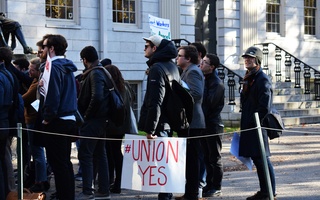{shortcode-61bc153d477f1225d3663006699222008dc8f5cd}
UPDATED: March 30, 2018 at 3:50 p.m.
Graduate students debated the merits of unionization ahead of an upcoming election to determine whether eligible students will form a union to collectively bargain with the University at a forum hosted by The Crimson Thursday evening,
The election, set to take place on April 18 and 19, comes after a previous vote in Nov. 2016. The results of the 2016 unionization election were the subject of over a year of legal back-and-forth between the Harvard Graduate Students Union-United Auto Workers and the University over the required lists of eligible voters provided by Harvard.
In December and January, the National Labor Relations Board determined that a second election was warranted due to inadequacies in the voter list. For example, some students from the Graduate School of Design were not included on the initial list.
At the forum, representatives from student groups HGSU-UAW and Against HGSU-UAW discussed several contentious aspects of the proposed unionization plan, including the union’s ability to raise wages and effectively combat sexual harassment.
One such point of contention was the possibility of a strike. Panelist Momchil Tomov, an Against HGSU-UAW representative, noted that many graduate students in the sciences might be reluctant to strike if missing work would imperil their research or their relationship with their supervisors.
“A lot of people doing research in, let’s say, wet labs, they work—you know, for their experiments, they just have to come in there,” Tomov said. “Especially if they work with animals, they have to come in there every day at a given time, and they can’t just decide for a week, ‘Oh, I’m not going to come in today.’”
HGSU-UAW organizer Justin Bloesch countered that a strike would be a “last resort in a negotiation process,” used only to protect essential benefits.
“If you don’t want to go on strike, no one’s going to make you go on strike,” HGSU-UAW organizer Sejal Singh said.
Another topic of debate was the dues pulled from students’ salaries, which members of the bargaining unit would be required to pay if HGSU-UAW prevails. The UAW’s base rate for members is set at a minimum of 1.44 percent of monthly wages.
Singh, noted that, per UAW policy, a “large part” of the dues collected from students will stay with HGSU-UAW. The remaining portion will go to the international UAW, for expenses such as the strike and defense fund.
Jae Hyeon Lee, a representative for Against HGSU-UAW, said the inconvenience of a union would likely outweigh any potential gains in graduate students’ salaries or benefits.
“Why would we go through all this trouble for just an incremental gain?” he said.
This article has been revised to reflect the following clarification:
CLARIFICATION: March 30, 2018
A previous version of this article identified Jae Hyeon Lee as an organizer for Against HGSU-UAW. To clarify, he is a representative for that organization.
—Staff writer Shera S. Avi-Yonah can be reached at shera.avi-yonah@thecrimson.com. Follow her on Twitter at @saviyonah.
—Staff writer Molly C. McCafferty can be reached at molly.mccafferty@thecrimson.com. Follow her on Twitter at @mollmccaff.
Read more in News
Admitted Students React with Shock, GratitudeRecommended Articles
-
Harvard: Drop the AppealUsing the University’s resources to deny graduate workers their democratic right to a free and fair election on unionization—whatever the results of that election—is a misuse of funds.
-
 At 'Drop the Appeal' Rally, HGSU-UAW Presents Petition to Mass. Hall
At 'Drop the Appeal' Rally, HGSU-UAW Presents Petition to Mass. Hall -
 Graduate Student Council Urges Harvard To Withdraw NLRB Appeal
Graduate Student Council Urges Harvard To Withdraw NLRB Appeal -
 Some Undergrad TFs Unaware of Potential Impacts of Unionization
Some Undergrad TFs Unaware of Potential Impacts of Unionization -
 Curran Emails Students Highlighting Anti-Union Concerns
Curran Emails Students Highlighting Anti-Union Concerns













